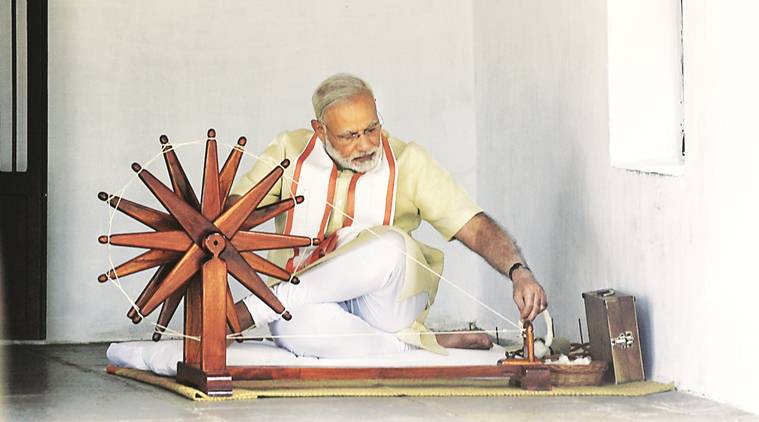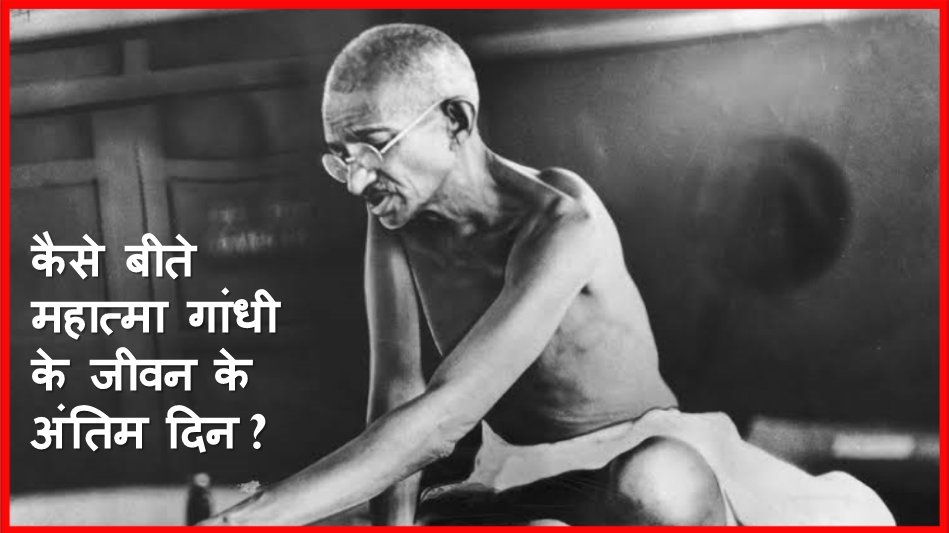VIEWPOINT
As the government plans to celebrate Gandhi’s 150th birth anniversary with a spectacular show, the author reveals its falsehood – packaging and branding Gandhi while killing and insulting his essential spirit.
Avijit Pathak is a Professor of Sociology at JNU, New Delhi.
[dropcap]T[/dropcap]he political class seems to have specialized in the technique of packaging Gandhi, selling him as a ‘brand’, and thereby separating our real existence from the life that Gandhi led–the politics he initiated, the religiosity he practiced, the socio-economic landscape he imagined for India, and the ethical quest in everyday life he spoke of as a form of his constant prayers. Gandhi as a brand, it seems, sells. With Gandhi and Buddha, project the’ virtues’ of a ‘non-violent’ Indian civilization; and at the same time, promote violence, reckless consumerism, communal conflicts, caste hierarchies and economic inequality.

After every act of lynching, speak of the dhamma of Buddha, and feel good. After every incident of rape, refer to the glory of Bharat Mata. And after every incident of displacement, deforestation and environmental disaster, deliver a lecture on Gandhi. It is like what an exam-centric schoolchild does-writing a bookish answer while laughing at its absurdity as he sees that the world is altogether different from what the book prescribes. Write that India is secular, and see communal violence in your locality. Write that Gandhi is the father of the nation, and see the assertion of the killers of Gandhi. Write about Buddha and peace, and feel happy seeing the ‘surgical strikes’. We live amid these absurdities-the vast domain of falsehood. This is the theatrical stage of politics.
Write that India is secular, and see communal violence in your locality. Write that Gandhi is the father of the nation, and see the assertion of the killers of Gandhi. Write about Buddha and peace, and feel happy seeing the ‘surgical strikes’. We live amid these absurdities-the vast domain of falsehood. This is the theatrical stage of politics.
No wonder, this time on the occasion of Gandhi’s 150th birth anniversary, the government is thinking of a gorgeous spectacle – international singers to virtual reality shows, symposia of Nobel peace laureates to talks by spiritual gurus, commemorative stamps and coins to Gandhi black belts. Fantastic! Ask the government a counter question: Is it thinking something about the increasing communalization of consciousness, the normalization of aggression in everyday life, the vulgarity of the glitz of the affluent amidst poverty, suffering and joblessness? In fact, had the government or the ruling regime shown some sensitivity and tried to create a relatively peaceful, decentralized, ecologically sensitive and egalitarian society, it would have truly done some justice to the Mahatma’s legacy. But then, if you are empty from inside, you need an armour, a gorgeous garment to prove yourself. No wonder, the more we kill Gandhi’s spirit the more we begin to ‘worship’ him through these fancy rituals. It is like an ugly/wealthy trader showing his religiosity by offering gold to the Tirupati temple. Neither Kabir nor Mira did require this demonstration of faith because God, for them, was the simple/non-armoured rhythm of life filled with the ecstasy of love.
Let me refer to three central components of the Gandhian worldview and politics.
First, it is impossible to understand his notion of swaraj without what he regarded as soul force -qualitatively different from the demonic brute force. While brute force is implicit in the narcissistic desire of the heavily centralized authoritarian regime, soul force celebrates decentralization, ‘oceanic circles’, enriched self-reliant moral communities and people’s power. While brute force invites an obsessive technocratic rationality with its principle of domination and manipulation of nature by intensifying man’s greed and desire for false needs, soul force cherishes a principle of connectedness between human species and the ecosystem, and cultivates man’s spiritual strength to live with a reasonable degree of austerity and life’s true and genuine needs. Freedom or swaraj is impossible without soul force.
Second, no resistance against an oppressive practice becomes truly effective without the moral power of satyagraha. This is possible only when we look at ourselves, acknowledge our own shortcomings, and engage in a process of self-purification. Overcoming the inner enemy–our greed, our aggression, our temptations–is no less important than fighting the external enemy. Hence brute force cannot be fought by yet another round of brute force, no matter how tempting it looks like. The only answer to brute force is soul force–the art of satyagraha: the intensity of moral courage and the ability to resist the temptation of ‘defeating’ the violent oppressor at his own game. In other words, the practice of politics, for Gandhi, is not separated from the ethical/spiritual domain. For him, sadhana meant the quest for spirituality in the domain of politics.
Third, religion, for him, was enabling, not constraining. Yes, he called himself a sanatani Hindu. Yet, he didn’t allow his religion to close all other windows. He conversed with the Sermon on the Mount; he loved Tolstoy and Ruskin; he resisted what these days we regard as Hindutva politics through his cross-religious dialogue and cultural syncretism. Moreover, his conscience was more important than his religious identity–something that the likes of Savarkar and Jinnah didn’t comprehend. In a way, religiosity taught him the ethic of care, love and togetherness. Not surprisingly, even when partition violence was shattering his doctrine of ahimsa he didn’t give up. Till the last moment of his life (before he was killed by a Hindu fanatic) he worked for the spirit of the unity of religions and cultural pluralism.
If we are sincere in articulating our gratitude for Gandhi, we should strive for these three path-breaking ideals. However, we are doing everthing that goes against the spirit of Gandhi. As the neo-liberal gobal capitalism embraces social consevatism of the Hindu Right, we invite the tyranny of brute force -technological violence, might of majoritarianism and reckless consumerism reducing the world into a mountain of garbage. With lynching, mob violence, surveillance machineries, hate speeches, and surgical strikes we witness the death of satyagraha and assertion of hyper-masculine/militaristic nationalism. Likewise, Gandhi’s religiosity is destroyed by all those whose primary aim is a strange form of saffronization (saffron is otherwise a divine colour revealing renunciation of limitedness and bondage) aiming at the annihilation of the ‘Muslim invaders’.
What a joke! Murder Gandhi; and then sell him as a ‘brand’. When should you and I acquire the courage to say: enough is enough, stop this nonsense?
[irp]












